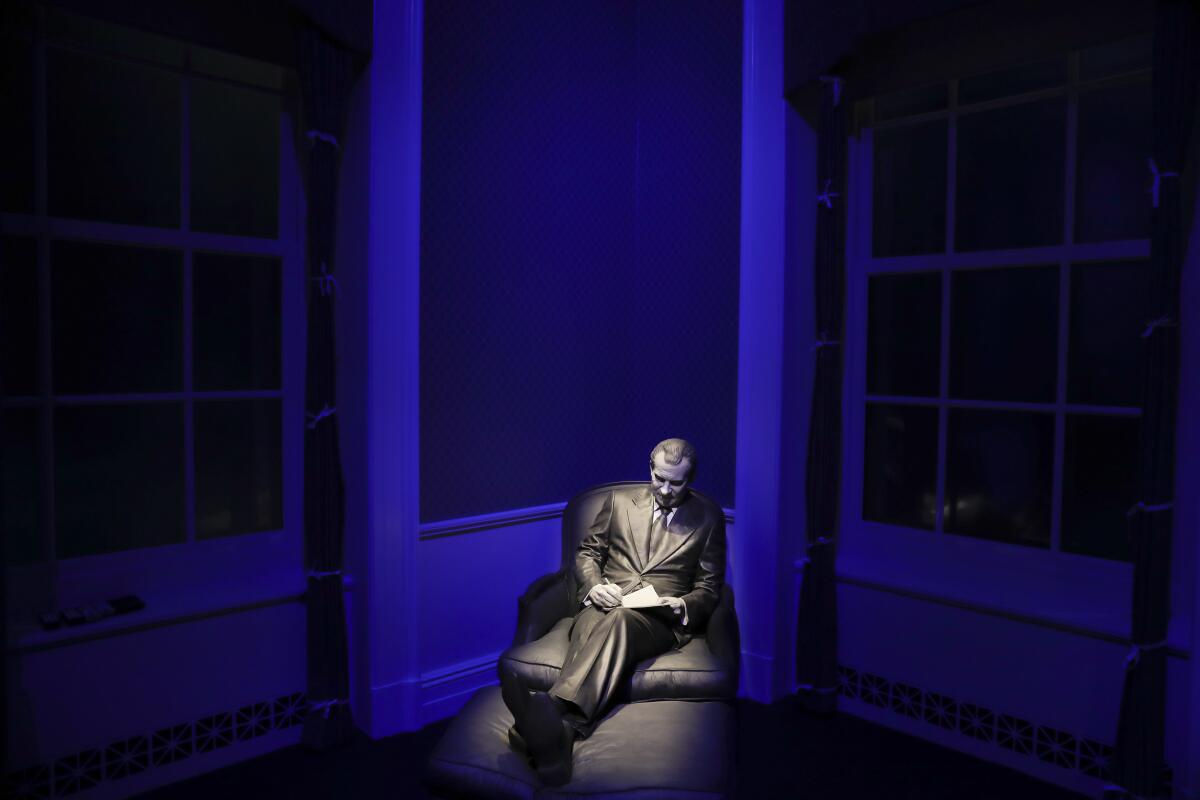Op-Ed: What would a Trump presidential library look like?

Picture it: The Donald J. Trump Presidential Library and Museum. Visit the Gallery of Tweets and the Wing of âPerfectâ Calls. Snap a souvenir selfie of yourself carting off a replica of Nancy Pelosiâs podium before chowing down on âBigly Burgersâ at the Covfefe CafĂŠ.
Iâll be there. Just as I will someday visit Barack Obamaâs and President Bidenâs libraries. Just as I have walked through each of the 13 presidential museums administered by the National Archives save for Lyndon B. Johnsonâs (Austin, Texas) â which I shall rectify post-pandemic.
In addition to their caches of precious documents, presidential libraries pay tribute to the accomplishments and flaws of our chief executives â and celebrate the cities and towns across the nation from whence they came. My impression is that these museums are fair to their subjects, and it is my hope that the libraries to come for our 44th, 45th and 46th presidents continue this trend.
An interview with an architect who imagined Trumpâs library. Cubaâs artist crackdown. Plus, your thoughts on virtual arts and Lou Harrisonâs generosity, in our weekly arts newsletter
However, Trump turned untruth not just into an art form but a weapon, and the Archives faces the tremendous task of fashioning a faithful narrative of his years in office: good, bad and very ugly.
Of course there is a natural urge to avoid âunpleasantness.â A docent at the Richard M. Nixon Library and Museum (Yorba Linda) told me that when the 37th presidentâs museum opened â it was then privately run â there was no mention of Watergate. Minor oversight there. This was corrected when the Archives took over, and a timeline of the scandal that forced Nixon from office now stands alongside totems to his many accomplishments, among them âopeningâ China and proposing the Environmental Protection Agency.
As Nixon found out, life doesnât end the moment a president departs 1600 Pennsylvania Ave. He lived long enough to see his reputation, if not salvaged, favorably altered in his years as an elder statesman.
As for successfully turning around a reputation, the absolute winner was Herbert Hoover (West Branch, Iowa). Despite his presidency ending when the country was in the throes of the Great Depression, Hooverâs expertise as a powerhouse administrator of public programs was later sought by many of his successors â with the notable exception of his vanquisher, Franklin D. Roosevelt (Hyde Park, N.Y.).
Harry S. Truman (Independence, Mo.) called upon Hoover for advice on helping rebuild post-World War II Europe, given the former presidentâs work providing aid to Europe after World War I. Dwight D. Eisenhower (Abilene, Kan.) and John F. Kennedy (Boston) sought his counsel too. At his museum, Hoover is seen smiling in photos with many of his successors.
Which brings me to George W. Bush (Dallas). His museum reminds us of his accomplishments in office, such as the Presidentâs Emergency Plan for AIDS Relief, which has done incredible work on fighting AIDS in Africa. It also has copies of the speech Bush gave at the 2016 dedication on the National Mall of the National Museum of African American History and Culture, which Bush authorized in 2003. But he and Vice President Dick Cheney have much to answer for too, which can be debated while exploring the libraryâs exhibits on 9/11 and the wars in Afghanistan and Iraq.
At the William J. Clinton Library and Museum (Little Rock, Ark.), I flipped through declassified presidential daily activity logs. Though optimism was high and the economy roared during his presidency, Clintonâs appetites nearly sank him. His impeachment and the events leading to it are not glossed over at his museum. And despite defeating George H.W. Bush (College Station, Texas), Clintonâs respect for his predecessor was always apparent, particularly in his renaming the headquarters of the Central Intelligence Agency after Bush, a former director.
Bush Sr. is gone now, as are Ronald Reagan (Simi Valley) and Gerald R. Ford (Grand Rapids, Mich.). Jimmy Carter (Atlanta) is 96 and frail. On Inauguration Day, we saw Clinton, Obama and George W. Bush speak together from Arlington National Cemetery â members of the ex-presidents club. Biden will likely grace the stage with them again. Trump almost certainly will not.
But when Trump gets a library to house his papers, professionals from the Archives will curate and display his presidency for posterity, helping visitors understand this deeply flawed president whose impact on our culture and body politic is beyond dispute.
In college I saw Henry Kissinger recount to a packed USC auditorium about what he said to Nixon on the eve of the presidentâs departure from the White House: âHistory will treat you more kindly than your contemporaries.â
Itâs doubtful history will ever look kindly upon our 45th presidentâs stoking of the Capitol insurrection, but I expect one day to enter his library to see for myself.
Eric Althoff is a writer and editor based in Virginia.
More to Read
A cure for the common opinion
Get thought-provoking perspectives with our weekly newsletter.
You may occasionally receive promotional content from the Los Angeles Times.










